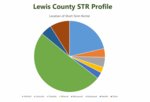

On Wednesday, staff from the Lewis County Community Development Department and Lewis County Assessor Dianne Dorey presented to the commissioners data on short-term rentals (STRs).
In Packwood especially, the short-term rental business has been booming. In forums on the topic, residents have voiced both concerns and excitement about the industry in the East County town.
In the workshop, Commissioners Sean Swope and Lee Grose, who were the only ones present at the time with Commissioner Lindsey Pollock not in attendance, both opposed enacting county business license requirements for STRs. Swope called the fee that owners would have to pay for the license “taxation without representation.”
Grose told The Chronicle that by the time the county enacts official plans for rural housing, he likely won’t be in office, but while he is, he will oppose any extra taxes. Especially given the current state of property taxes, he said, avoiding creating new taxes is important to him. During the workshop, he also called a license requirement on STRs a slippery slope.
“If you want to start taxing local businesses you better get out there and start taxing those flea markets,” Grose said Wednesday.
Grose recognized that in this case, STR businesses may not be local in the sense of ownership — as owners could live out of town, state or even country and still operate an Airbnb in Lewis County — but they do provide economic benefit to communities such as Packwood.
But Dorey said requiring a business license would be a fee — not a tax — covering the county’s cost to track STRs, which her office is required to do by law.
Earlier this year, Dorey’s office paid a research firm called Granicus to scrub the web for data on rentals in Lewis County. In April, Granicus found 402 STRs in the county out of a total 657 rental home listings including long-term rentals. Those numbers don’t include hotels or apartments, just houses. About half those STRs were in Packwood.
The presentation showed there are 93 known websites advertising STRs in Lewis County, including Airbnb and Vrbo, which are the most well-known.
Airbnb and Vrbo hosts pay lodging taxes to the county like all motels and inns, as is required by state law. The other 91 sites may not necessarily require that, according to Dorey.
The firm can only find the listings that are advertised on the internet. If someone just leases their place to family or friends, for example, Granicus wouldn’t be able to see that. Therefore, the actual numbers of listings for both STRs and total rentals are almost definitely higher, Dorey said.
With that data, the county discovered hundreds of STRs from Pe Ell to Packwood that were not self-reporting as a business and paying the state-required lodging taxes. The assessor’s office sent letters to all hosts who were known to be out of compliance.
Dorey told The Chronicle paying Granicus costs $10,000 per year. If the county were to require a business license process for STR owners, Granicus’ services would no longer be necessary.
This did not sway Grose or Swope, with the latter calling the fee “penalizing.”
Dorey said “identifying these places is pretty important, and I’ll tell you why.”
She mentioned a 250-person wedding at an STR in Packwood in a small neighborhood that led to folks sleeping outside scattered around, cars parked unsafely and a generally rowdy group of people all at a one-bedroom home.
“There was lots of alcohol involved and the partying went on until all hours of the morning and a lot of the guests ended up sleeping on neighbors’ porches and in their yards,” Dorey said.
As she put it, because the county didn’t have the information on the STR owner, the sheriff’s office could not contact the owner to tell them what was going on. When they finally got ahold of the owner, it was someone who lived in Portland, she said.
“Either the county can continue to pay an enormous amount of money to Granicus to do this, because, by law, I have to identify these folks or the option is we charge a business license, a nominal amount,” Dorey said. “And that’s set by you, you have control over that. Some counties charge $500 per year on a business license, others have charged as little as $25.”
Beginning in July, county staff will work to identify key stakeholders and start a public engagement process in order to create an existing conditions report on housing issues facing unincorporated but developed rural communities.